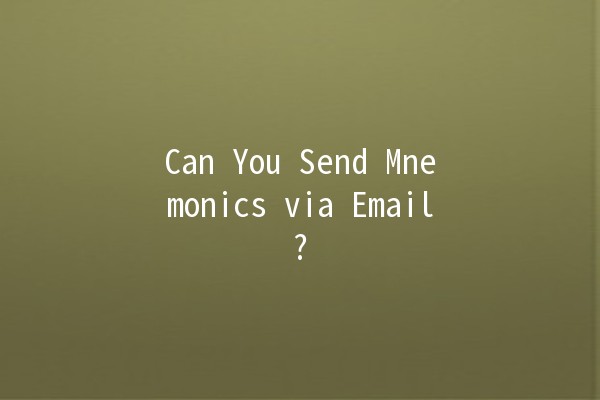




In the digital age, sharing sensitive information securely is a topic of great concern. One common question among cryptocurrency users and digital asset holders is whether mnemonic phrases (or seed phrases) can be sent via email. This article aims to explore this question by analyzing the implications associated with sending mnemonics through email, along with best practices to ensure your information remains safe and secure.
A mnemonic phrase is a sequence of words that encodes a secret key or a recovery phrase for a cryptocurrency wallet. This phrase usually consists of 12 to 24 words and is used to access your wallet. You can think of it as a password to your digital assets.

Mnemonic phrases are crucial because they allow users to recover their funds in the event of loss or damage to their devices. Someone who has access to your mnemonic phrase has complete control over your cryptocurrency holdings. This makes it vital to treat it with the utmost care.
One of the biggest risks associated with emailing sensitive information like a mnemonic phrase is the lack of encryption. Most email services do not encrypt messages by default, which means that anyone who intercepts the email can read its contents. This could include hackers, and even your Internet Service Provider (ISP).
Phishing is a prevalent method used by cybercriminals to deceive individuals into providing sensitive information. An attacker could easily create a fake email service that appears as a legitimate request for your mnemonic phrase. This can lead to unauthorized access to your cryptocurrency wallet.
Once you've sent an email, you lose control over it. The recipient may inadvertently forward your message to someone else, exposing your mnemonic phrase to unintended parties. This further escalates the risk of your funds being compromised.
Emails are often stored on multiple servers and devices, potentially forever. If any of these points are compromised, your mnemonic phrase could be at risk. Hacking incidents involving email accounts can expose stored messages, opening you up to theft.
If emailing your mnemonic phrase is not advisable, what alternatives do you have? Here are some secure methods for storing or sharing your mnemonic phrases:
Password managers often include secure storage for sensitive information like mnemonic phrases. These applications encrypt your data, making it difficult for unauthorized users to access it.
Example: Applications like LastPass or 1Password can securely store your mnemonic phrase, ensuring that it’s available only to you.
Investing in a hardware wallet can greatly enhance your cryptocurrency security. Hardware wallets store your mnemonic phrase offline, making them less susceptible to online attacks.
Example: Ledger and Trezor are wellknown hardware wallet brands that keep your mnemonic phrase secure.
If you need to share your mnemonic phrase with someone else, opt for an encrypted messaging application. These applications encrypt messages during transmission, providing an added layer of security.
Example: Signal and Telegram are established messaging platforms that offer endtoend encryption, making them safer for sharing sensitive information.
Creating a physical copy of your mnemonic phrase is another secure option. You can write it down and store it in a safe place, like a safety deposit box, to ensure it is only accessible to you or trusted individuals.
An airgapped device is completely isolated from the internet and any unsecured networks. You can store your mnemonic phrase on such a device, preventing any online access.
Example: A USB drive that has never been connected to the internet can serve as a secure storage medium for your mnemonic phrases.
If you've accidentally sent your mnemonic phrase via email, immediately consider your funds at risk. The best course of action is to transfer your assets to a new wallet with a different mnemonic phrase. Ensure that you use a secure method for generating and storing this new phrase.
Generally, it is not safe to send a mnemonic phrase via email due to the numerous risks associated with email communication. If you find yourself in a situation where you must share it, always use secure and encrypted methods.
Yes, multiple wallets can be generated from the same mnemonic phrase. However, this can lead to confusion over who controls which funds and is not typically recommended for managing digital assets.
Unlike passwords, mnemonic phrases are usually set upon wallet creation and do not need to be changed frequently. However, if you suspect your security has been compromised, it's wise to generate a new wallet with a fresh mnemonic phrase immediately.
If you lose your mnemonic phrase, you lose access to your cryptocurrency wallet permanently. There's no way to recover the funds without this phrase, which is why it's essential to store it safely.
Yes, cybercriminals often deploy phishing scams targeting cryptocurrency users to obtain mnemonic phrases. Be wary of unsolicited messages requesting your mnemonic phrase, and always verify the source before sharing any sensitive information.
Using the right practices to safeguard your mnemonic phrases is crucial. Understanding the implications of sending such sensitive information via email can help you to protect your digital assets effectively. Always prioritize security when handling your mnemonic phrases to ensure that your cryptocurrency holdings remain safe.